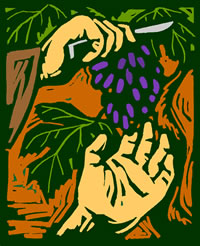
27th Sunday in Ordinary Time Year A
Seen from a human point of view, salvation history (the story of God’s dealings with humanity) is a tragedy; but the divine mercy and generosity has turned this tragedy into God’s triumph. This great drama comes to its climax, of course, in the life, death and resurrection of the Saviour: ‘God so loved the world that he gave his only Son’. The parable of Jesus in today’s reading from Matthew’s gospel refers to the tragedy that he now recognises to be inevitable. We have already become familiar with the original form of the parables of Jesus: a story that leaves his hearers confronted by an unsettling question. Today’s study of the formation of the gospels makes it clear that, as these parable stories were retold in the preaching of the early Church, they were often added to, to bring out lessons for later audiences. And it is evident that this parable – originally a challenge to leaders of the Jewish nation – has become, for those who have suffered persecution from the synagogue, a condemnation of the ‘chief priests and elders of the people’. The fact that Jesus foretells his death, but makes no reference to the resurrection that was so central to the faith of the first Christians, makes it clear that the parable is not a creation of the later Christian community, but is recalled as having been told by Jesus himself.
It is not difficult to identify the main elements of the original parable. A story that reflects common experience captures the attention of the audience, and unfolds predictably; the services of tenant farmers was commonly made use of by absentee landlords – a situation that not infrequently gave rise to disputes and conflicts, particularly if the landlord was not close at hand. At the same time, however, in the back of the minds of the audience is an awareness that, in the traditions of Israel, the vineyard theme has often been used to describe God’s dealings with Israel. We are told that the prophet Isaiah’s ‘Song of love for the vineyard’, echoed in the parable, was so well known in the time of Jesus that many people knew it by heart. It is a remarkable declaration – a moving expression of faith in the mysterious love and generosity that found expression in the election of Israel in the plan of God; and at the same time it is an acknowledgement of infidelity and failure. According to the usual pattern, as the story unfolds the audience is suddenly confronted by an unexpected turn of events. In this case it is the unreasonable decision of the landlord to send his own son on an errand that has led to so much violence and bloodshed: ‘They will respect my son’. Against the background of the vineyard theme, Jesus, who has come to recognise that his death is inevitable, confronts his hearers with the final expression of the folly of divine love.
As Matthew’s community tells the story of the parable, some of the modifications are obvious enough. In their account, the question Jesus puts to the leaders of the people has been added - the lesson of the parable is brought out more clearly, as the leaders are condemned out of their own lips. The reference to the psalm’s ‘stone rejected by the builders’, often repeated in the New Testament, is an explanatory addition, as is the conclusion: ‘The Kingdom of God will be taken from you and given to a people who will produce its fruit’. Matthew’s community knows that the parable is also a challenge for them – as the New Israel, they are now God’s vineyard: ‘Every branch in me that bears no fruit’, Jesus declares, ‘my Father cuts away’. Paul tells the Philippians that, if they bear good fruit, ‘The God of peace will be with them’.
John Thornhill sm

